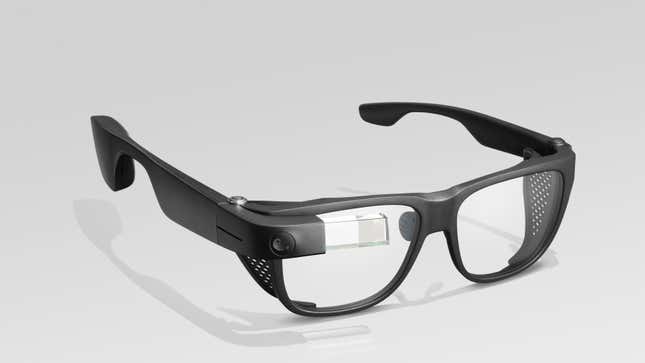
Almost two years ago, Google parent Alphabet reminded the world that Google Glass wasn’t dead—it just wasn’t for regular consumers. Rebranding Google Glass as an enterprise tool for blue-collar factory workers and doctors was a savvy move that breathed new life into the smart glasses. Today, Alphabet is building on the progress it made in its switch to enterprise with some refreshed hardware for Google Glass. It’s also transitioning Glass from its experimental X division to Google proper.
Dubbed Glass Enterprise Edition 2, the smart glasses are now powered by the Qualcomm Snapdragon XR 1 chipset. A blog post announcing the update explains the beefier CPU will supposedly enable better battery life and performance for tasks involving computer vision and machine learning. The new glasses also improve on the camera for better video and live streaming, and adds a USB-C port for faster charging.
Most notably, however, the new glasses are built on Android and support Android Enterprise Mobile Device Management. That’ll make it easier for companies to build new apps and integrate the glasses into existing services or APIs.

As noted before, Alphabet is moving the Glass team over to Google from X, its self-described “moonshot factory” aimed at developing pie-in-the-sky, more-science-fiction-than-real-life projects. The move would indicate that Alphabet has found much more success with Glass in the enterprise space, and that it’s expecting even greater success with Glass Enterprise Edition 2. The updates, which are more iterative than revolutionary, also confirm that the company seems to be doubling down on the enterprise route. That tracks—building a pair of consumer smart glasses is tough, as Google itself learned when the original Glass fell flat on its face. Meanwhile, another smart glasses company North recently laid off 150 employees, a substantial number of its workforce. Likewise, last year Intel completely shuttered its Vaunt smart glasses division just two months after showcasing a new prototype.
Whether or not Google will ever attempt to make consumer-focused smart glasses is debatable. That would depend on solving problems like style, functionality, and privacy—all factors that doomed the original Glass but aren’t quite as lethal in the enterprise space.